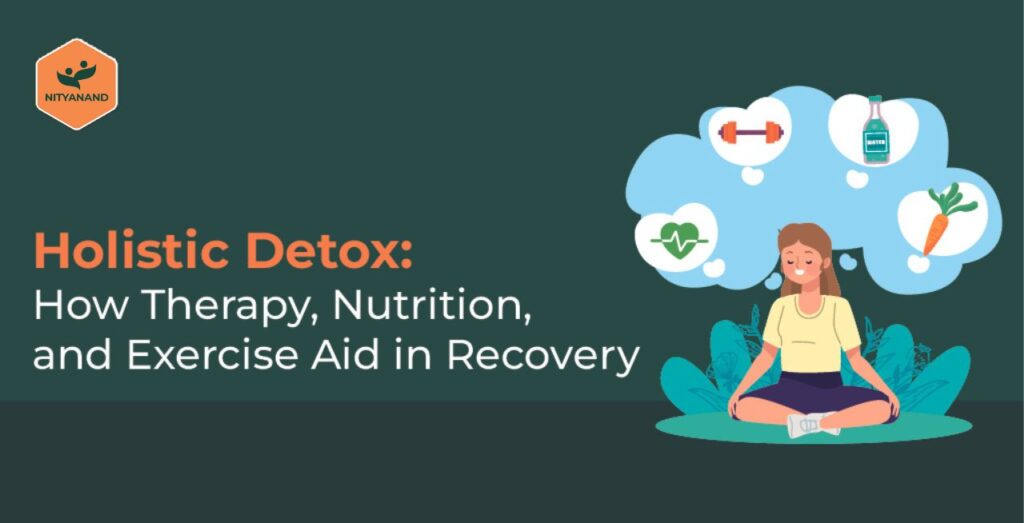Holistic Detox: How Therapy, Nutrition, and Exercise Aid in Recovery


The journey to recovery from addiction is often challenging and multifaceted. It goes beyond mere abstinence; it requires healing of the mind, body, and spirit. Holistic detox, a comprehensive approach to rehabilitation, focuses on addressing these aspects. In this blog, we’ll delve into the vital role therapy, nutrition, and exercise play in aiding recovery.
1. Therapy for Emotional Healing
Therapy is a cornerstone of holistic detox, as it assists individuals in addressing the emotional and psychological aspects of addiction. It can take various forms, such as individual counseling, group therapy, or family therapy. Here’s how therapy aids in recovery:
- Identifying Root Causes: Therapy helps individuals identify the underlying causes of their addiction, which may include trauma, stress, or mental health issues. Understanding these root causes is crucial for lasting recovery.
- Coping Strategies: Therapists teach coping strategies and life skills that enable individuals to deal with triggers, cravings, and stress in healthier ways. Cognitive-behavioral therapy (CBT) is one of the most effective approaches in this regard.
- Emotional Support: Group therapy provides a supportive environment where individuals can share their experiences, gain insights, and receive encouragement from others on a similar journey.
- Self-Care and Hygiene: Basic self-care tasks, such as personal hygiene or maintaining a clean living environment, may be neglected. This can lead to physical health issues and further social isolation.
- Medication Management: Schizophrenia is often treated with medication, and adhering to a medication regimen is crucial for symptom management. However, individuals may struggle with the side effects or may forget to take their medication consistently.
- Stigma and Discrimination: Schizophrenia is still widely stigmatized, leading to discrimination and a lack of understanding in society. This can exacerbate the challenges faced by individuals with the disorder.
2. Nutritional Support
Proper nutrition is often overlooked but is a critical component of holistic detox. Addiction can take a toll on one’s physical health, and replenishing the body with essential nutrients is essential. Here’s how nutrition aids in recovery:
- Repairing the Body: Substance abuse can damage the body’s organs and disrupt its natural functions. A balanced diet helps in repairing this damage and improving overall health.
- Stable Blood Sugar: Maintaining stable blood sugar levels is crucial for reducing cravings. A diet that avoids excessive sugar and processed foods helps in this regard.
- Vitamin and Mineral Supplementation: Many individuals in recovery may have nutritional deficiencies. Supplementing with vitamins and minerals can aid in the recovery process.
3. Exercise for Physical and Mental Well-being
Exercise plays a dual role in holistic detox, benefiting both physical and mental health. Regular physical activity can be a powerful tool in the recovery journey:
- Stress Reduction: Exercise releases endorphins, the body’s natural mood lifters. This can help reduce stress and anxiety, common triggers for relapse.
- Improved Sleep: Many individuals in recovery struggle with sleep disturbances. Regular exercise can promote better sleep patterns, aiding in overall well-being.
- Rebuilding Self-Esteem: Achieving fitness goals can boost self-esteem and self-confidence, which are often eroded during addiction.
- Routine and Structure:Establishing an exercise routine provides structure and a sense of purpose, important for those in recovery.
The Synergy of Holistic Detox
Holistic detox combines therapy, nutrition, and exercise to create a synergistic approach to recovery. When these elements work together, the chances of long-term sobriety increase significantly. The key to success lies in individualized treatment plans that address each person’s unique needs and challenges.
- Customized Treatment Plans: Holistic detox recognizes that every individual’s journey is unique. Therefore, its tailors’ therapy, nutrition, and exercise to meet their specific needs.
- Comprehensive Care: By addressing the mind, body, and spirit, holistic detox provides a well-rounded approach to recovery. It doesn’t just focus on symptoms but seeks to heal the whole person.
- Long-Term Success: Holistic detox is not a quick fix but a sustainable approach to recovery. It equips individuals with the tools they need to maintain sobriety and lead a fulfilling life.
Conclusion :
In conclusion, holistic detox, encompassing therapy, nutrition, and exercise, offers a comprehensive and effective approach to addiction recovery. It recognizes that healing is a multifaceted journey that requires addressing the emotional, physical, and psychological aspects of addiction. By incorporating these elements, individuals can increase their chances of achieving lasting recovery and rediscovering a healthy, balanced life.

